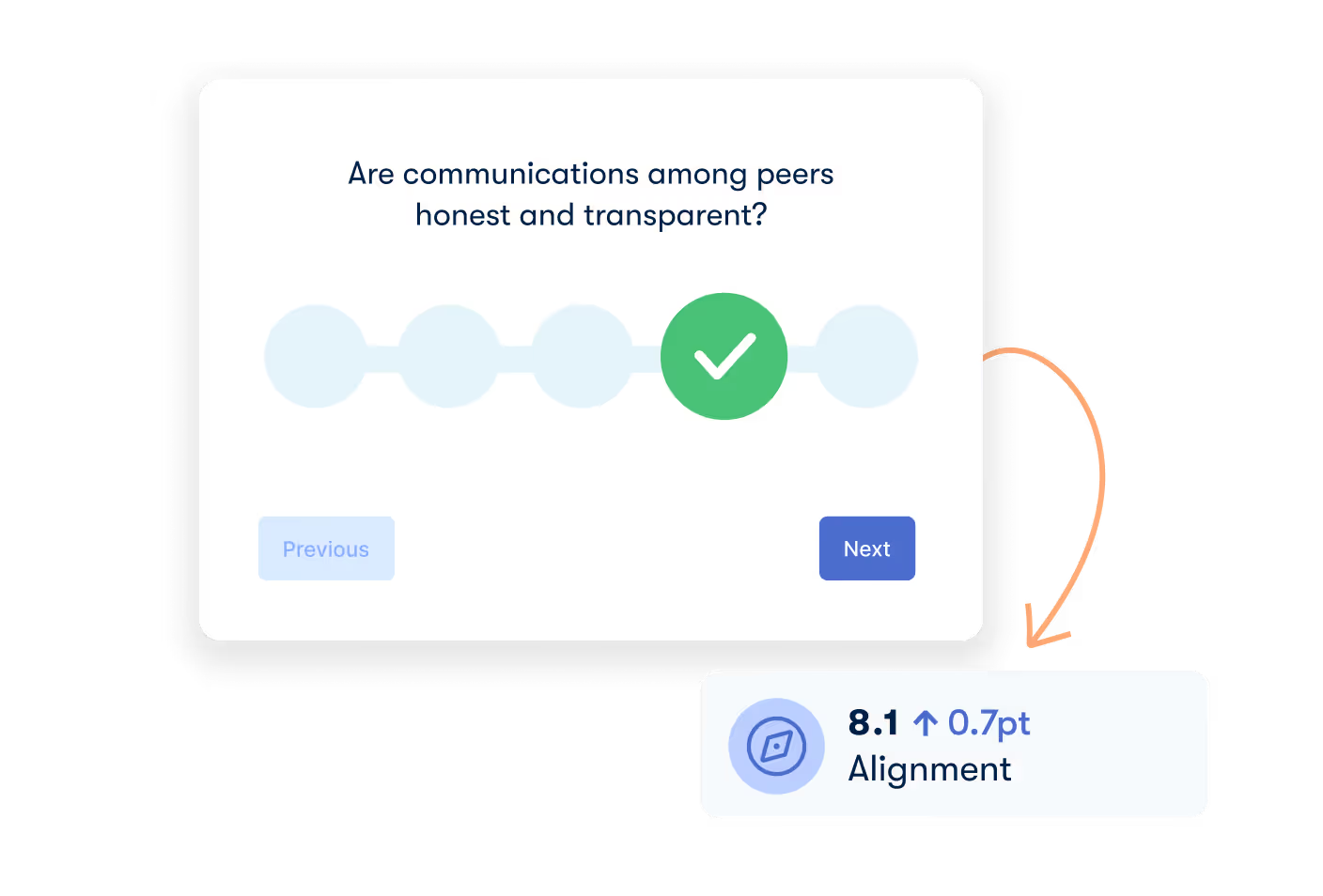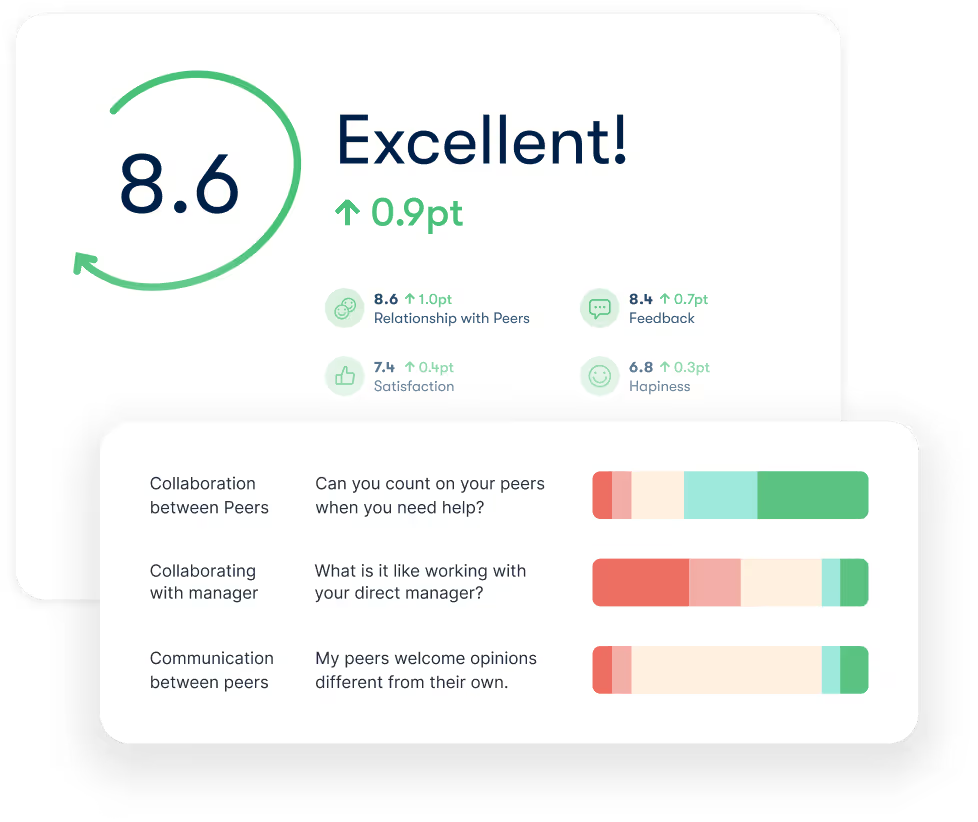10 Benefits of employee engagement surveys

Discover Workleap Officevibe's benchmark report on 12 key employee engagement metrics

With the rise in remote work since the pandemic's arrival and the decrease in face-to-face connection, today's managers face real challenges assessing how satisfied their team members are with their jobs. The good news? There are solutions, like employee survey platforms, that measure engagement and can bridge the gap between you and your people, giving you an insightful view of how everyone feels.
Unlike generic online surveys that can seem dry and overwhelming, employee engagement surveys turn talking points into action items and action items into tangible outcomes.
Keep reading as we share some of the benefits of employee surveys and how they can help you perform as the leader your company needs.
What is the purpose of employee surveys?
Above all, the purpose of employee engagement surveys is to determine employee sentiment and attitude: their levels of motivation for and commitment to their work with you and their satisfaction with your organization and the environment it provides.
{emphasize}
Officevibe Pulse Surveys on feedback found that:
- 37% of employees said they don't feel close with their manager
- 31% of employees wish their manager communicated more frequently with them, and
- a whopping 96% of employees said receiving regular feedback is a good thing
{emphasize}
Other Officevibe data shows that many workers want open communication with their companies' leaders but don't often receive it, maybe because their supervisors are unaware of their communication needs.
The results of anonymous feedback from employee engagement surveys can open managers' eyes about how to establish quality communication with and between their team members.
{emphasize}
💡 Think of these surveys as market research for your workplace, encouraging your workers to respond personally. You'll find that your employees feel heard, and you'll be able to spot any potential discomfort before it becomes a problem.
{emphasize}
Putting collective energy and effort into employee surveys helps remove the guesswork from teambuilding, giving you the information you'll need to nurture and grow a more comfortable office environment. Surveys can gauge your peoples' satisfaction and help you set the course for a new communication style in your company. Initiating an honest feedback loop lets you gain insights and makes employees feel valued, giving them a stake in the company's future. Being heard matters.
The top 10 benefits of employee surveys
Surveys that encourage your team to express their satisfaction (or dissatisfaction) and suggest ways to enhance the corporate culture can serve as key drivers for increasing retention and productivity. With them, you can achieve the following.
1. Improve employee morale
Research shows most people appreciate a commitment to frequent communication. Collecting feedback from your team shows them that you're listening.
Using employee surveys, leaders like you can assess engagement and potential risks in your organization, department by department. The information you learn from analyzing an engagement survey can indicate how your teams feel about management style or any other specific issue. They can also highlight wins and achievements that may have gone unnoticed. Even if you can't implement every piece of feedback right away, you'll be able to tackle achievable short-term issues that benefit teams over the long term.

Employee engagement surveys can also highlight wins and achievements that may have gone unnoticed. They can offer a chance to address lingering conflicts or start essential conversations about performance and productivity. When you're aware, gathering feedback, and tapping into the latest news, you can recognize your team for their hard work—a surefire way to increase employee morale, especially when done consistently.
Once plugged into the emotional state of your company, you can foster a collaborative environment that encourages your people and gets them more engaged in their work. With the knowledge you glean from your customized survey, you'll have a fresh batch of topics to follow up with as you aim to understand your group better.
2. Detect knowledge gaps
Survey findings can help leaders identify possible knowledge gaps on the individual and team levels. Did everyone understand the objectives presented at the last company meeting? Do they know how they will play a part in contributing? Are they equipped to perform the necessary tasks?
Leaders can conduct surveys to drill in on job specifics. Survey results can quickly catch areas that could turn into costly mistakes. Whether it's a lack of complete comprehension or an undeveloped skill, detecting early means you can address them early either with training, mentoring, or dedicated one-on-one meetings.
3. Better employee health
Research studies have shown that poor communication can cause anxiety and depression, even inducing feelings of social isolation. Have you ever considered how mental health might be affecting your employees' work performance? Are their mistakes purely errors, or are they a result of feeling distracted, lonely, and disengaged at work?
[ov_cta id="5116629"]
One of the many benefits you gain when you ask for employee feedback is creating an open dialogue within your organization. Posing specific survey questions that they can freely answer will give many employees a safe way to express concerns weighing on their minds.
We all know, intuitively, that each of us benefits from compassionate leadership. When you use employee engagement surveys, you're opening up a space and inviting your workers to enjoy a direct line of communication with you. Hopefully, doing so will help to alleviate that feeling of isolation and improve employee satisfaction and mental health overall.
4. Happier employees
When you create a company culture that encourages open communication, you encourage employees to speak their minds and make mistakes without being afraid of rejection. Your team members can trust each other to give constructive criticism from a place of compassion.
Our Officevibe Pulse Survey data shows that 83% of employees appreciate receiving feedback, regardless of whether it's positive or negative. Be sure to find chances to give affirming and positive feedback informally and through formal channels if you want to nurture your workers' good feelings about the workplace.

Up-to-date feedback allows employees to do their jobs without the stress of feeling misunderstood. When you, as the employer, provide resources to managers to open lines of communication, the whole organization will benefit. Expressing expectations can provide much-needed clarity and lead to better job performance.
5. Improve employee safety
Surprisingly or not, engagement is also a matter of safety. Studies show that employees who feel more engaged with their jobs tend to have a higher awareness of their surroundings, leading to fewer safety incidents in the workplace.
Just as enhanced, engaged communication will boost employee morale, your survey data will give you insights about how engaged employees might become safer workers, too. You'll end up with a happier, healthier workplace, saving money and time as you lower risk.
Psychological safety also comes into play and is a key performance factor.
Our data shows that 20% of team members do not feel like they can voice new ideas.
By offering your people tools like engagement surveys to communicate, you're offering a platform for them to speak up. When you foster a culture of open communication, you make way for creative thought and innovation.
6. Increase employee satisfaction
In this work from home era, finding fulfillment on the job requires engagement with the work itself and the people: managers, coworkers, clients, and other shareholders. Talking to faces on computer screens limits human interaction, and the lack of face-to-face encounters risks making people feel more alienated and less motivated or passionate about their work. The lack of connection can also reflect on satisfaction levels with supervisory relationships.
An all-in-one employee survey tool will measure engagement metrics like job satisfaction, along with things like peer relationships, wellness and stress, company alignment, and more.
By seeing survey responses and survey scores you can get an accurate insight into how your team is doing. From there, you can take the necessary steps to improve job satisfaction on your team. Further, by reporting on employee satisfaction levels, you're able to track and analyze whether your efforts to improve are viable over time. That's real progress!

7. Maintain higher retention
Very few people are mind readers. So it's safe to say that managers can't always know what's going on in their people's heads. It isn't always easy to gauge when people feel underappreciated or underutilized in their job. And a lack of recognition is one of the main drivers that cause employees to hit the road.
When employees don’t feel like their contributions count, they’ll seek out an environment where they do. So how can you make sure that your people feel like their voice is heard and concerns are addressed? Use an employee survey to tap into the current vibe and quickly learn about any possible challenges or disruptions.
{emphasize}
Officevibe has over 45 free employee survey templates (and counting!) to help. There's even an employee recognition needs survey that has questions to help you get to know what kind of recognition your team seeks and what makes it meaningful.
{emphasize}
8. Increase employee loyalty
An engaged, satisfied employee who's committed to their objectives and feels recognized by their company is less likely to leave. How can you, as a leader, make sure that these needs are met? Measure employee engagement regularly.
Providing a vehicle for your people's voices to be heard signals to them that you care about them and how they feel about the topics of the survey. How is peer-to-peer interaction these days? Are they feeling overwhelmed with the workload? Is there anything you can do as a manager to better support them with an upcoming initiative? Surveys provide insights so that you can take action.
Relationships are reciprocal. If any organization can care about its people, people will care about the organization.
9. Improve customer service
Have you ever tried to offer customers assistance while in a bad mood? It likely proved challenging to keep up the guise of friendliness and deliver customer satisfaction when you felt frustrated. Managers of companies find that the same is valid for employees.
Wearing a smile is a chore when you feel burned out. If your management group can create a space where employees can express how they feel and then productively release some of that frustration, your company will ultimately see an improvement in their mood, their performance, and their satisfaction. That will move you in the right direction.
10. Create a catalyst for change
Conducting employee surveys allows you to gather data to discover otherwise unvoiced concerns. You can dramatically shift your company's culture by attending to these issues.
As you improve conditions for your people, everyone benefits. Happy employees stay longer, work harder, and simply make for a better working environment for all.
Can surveys improve employee engagement?
An employee engagement survey has the power to revive disengaged people. Ok, it's unlikely that just one survey can "do the trick." Instead, it's more about implementing a feedback culture that uses surveys as one of the tools and then acts on the feedback to motivate and encourage employees.
The potential for improving engagement is endless, but you'll only see behavioral change if you act on the employee survey results.
[ov_cta id="5116629"]
For example, you could discover that your staff's primary concern is a lack of feedback and encouragement. Solution? You could collaborate with your team to develop an improved feedback system.
You might also follow up with struggling team members to offer enhanced support and resources or find ways to reward excellent work better, utilize individual skills, or increase employee benefits.
Why is it important to survey your employees?
Employee engagement surveys can help leaders understand areas where their teams struggle, feel dissatisfied, or require extra support. Understanding your employees' needs is part of being a good leader, and engagement surveys are one of many resources that can help you and your team succeed.
How do we do it? With Officevibe's Pulse Survey tool. It's an entirely turn-key solution that empowers employees, collecting, analyzing, and suggesting improvements based on their feedback. Use it to find the knowledge you need to lead with confidence while building trust with your team.
Give HR and managers the clarity, confidence, and connection to lead better every day.







.avif)




